2010年中考英语并列句复习
- 格式:ppt
- 大小:1.02 MB
- 文档页数:17
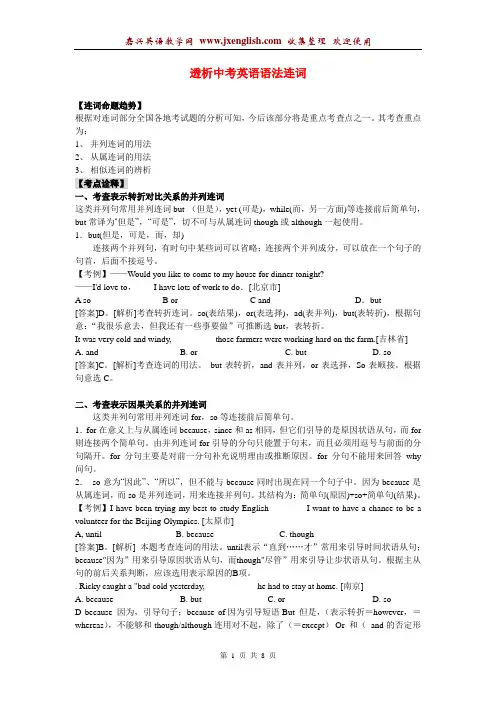
透析中考英语语法连词【连词命题趋势】根据对连词部分全国各地考试题的分析可知,今后该部分将是重点考查点之一。
其考查重点为:1、并列连词的用法2、从属连词的用法3、相似连词的辨析【考点诠释】一、考查表示转折对比关系的并列连词这类并列句常用并列连词but (但是),yet (可是),while(而,另一方面)等连接前后简单句,but常译为‘但是”,“可是”,切不可与从属连词though或although一起使用。
1.but(但是,可是,而,却)连接两个并列句,有时句中某些词可以省略;连接两个并列成分,可以放在一个句子的句首,后面不接逗号。
【考例】——Would you like to come to my house for dinner tonight?——I'd love to,____I have lots of work to do.[北京市]A soB orC and D.but[答案]D。
[解析]考查转折连词。
so(表结果),or(表选择),ad(表并列),but(表转折),根据句意:“我很乐意去,但我还有一些事要做”可推断选but,表转折。
It was very cold and windy, _________ those farmers were working hard on the farm.[吉林省] A. and B. or C. but D. so[答案]C。
[解析]考查连词的用法。
but表转折,and表并列,or表选择,So表顺接。
根据句意选C。
二、考查表示因果关系的并列连词这类并列句常用并列连词for,so等连接前后简单句。
1.for在意义上与从属连词because,since和as相同,但它们引导的是原因状语从句,而for 则连接两个简单句。
由并列连词for引导的分句只能置于句末,而且必须用逗号与前面的分句隔开。
for分句主要是对前一分句补充说明理由或推断原因。
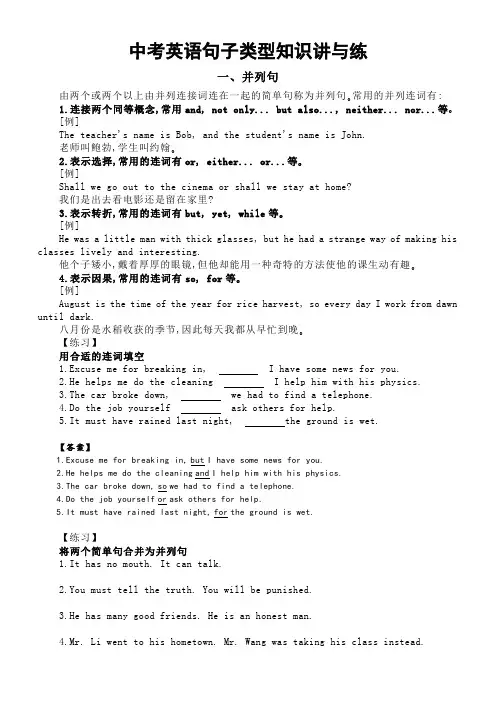
中考英语句子类型知识讲与练一、并列句由两个或两个以上由并列连接词连在一起的简单句称为并列句。常用的并列连词有:1.连接两个同等概念,常用and, not only... but also..., neither... nor...等。[例]The teacher's name is Bob, and the student's name is John.老师叫鲍勃,学生叫约翰。2.表示选择,常用的连词有or, either... or...等。[例]Shall we go out to the cinema or shall we stay at home?我们是出去看电影还是留在家里?3.表示转折,常用的连词有but, yet, while等。[例]He was a little man with thick glasses, but he had a strange way of making his classes lively and interesting.他个子矮小,戴着厚厚的眼镜,但他却能用一种奇特的方法使他的课生动有趣。4.表示因果,常用的连词有so, for等。[例]August is the time of the year for rice harvest, so every day I work from dawn until dark.八月份是水稻收获的季节,因此每天我都从早忙到晚。【练习】用合适的连词填空1.Excuse me for breaking in, I have some news for you.2.He helps me do the cleaning I help him with his physics.3.The car broke down, we had to find a telephone.4.Do the job yourself ask others for help.5.It must have rained last night, the ground is wet.【答案】1.Excuse me for breaking in,but I have some news for you.2.He helps me do the cleaning and I help him with his physics.3.The car broke down,so we had to find a telephone.4.Do the job yourself or ask others for help.5.It must have rained last night,for the ground is wet.【练习】将两个简单句合并为并列句1.It has no mouth. It can talk.2.You must tell the truth. You will be punished.3.He has many good friends. He is an honest man.4.Mr. Li went to his hometown. Mr. Wang was taking his class instead.5.He wants to be a writer. I want to be a scientist.【答案】1.It has no mouth, but it can talk.2.You must tell the truth, or you'll be punished.3.He has many good friends, for he is an honest man.4.Mr. Li went to his hometown, so Mr. Wang was taking his class instead.5.He wants to be a writer while I want to be a scientist.二、复合句1.概念主从复合句由一个主句和一个或一个以上的从句构成。从句通常由关联词引导,关联词将从句和主句联系在一起。2.分类按其在复合句中的作用,分为主语从句、表语从句、宾语从句、同位语从句、定语从句和状语从句。前四种从句在复合句中的作用相当于名词,统称为名词性从句。(1)主语从句How much income we can expect this year is not yet known.我们今年能有多少收入还不知道。Who will go is not important.谁将去并不重要。(2)表语从句The answer is that he is one of the top three physicists in his particular field.答案是:在他的特殊领域里,他是三位顶尖的物理学家之一。(3)宾语从句Scientists explain that the outside of the earth is made of a number of different plates.科学家解释说,地球的表层是由许多不同的板块构成的。(4)同位语从句The hope that he may recoveris not gone yet.他会康复的希望没有消失。(5)定语从句The man who is shaking hands with my father is a policeman.正和我父亲握手的那个人是个警察。A dictionary is a book which gives the meaning of words.词典是解释词语意思的书。This is the place where my mother was born.这是我母亲出生的地方。(6)状语从句Listen and be quiet while others are talking!在别人说话时要听着,保持安静!Go back where you come from.回到你来的地方去。You can tell me if you need help.【练习】判断下列句子含有哪种从句,并用横线标出1.When you see him, please say hello to him.2.Is he the man who wants to see you?3.I want to know what he has told us.4.The fact is that we have lost the game.5.What he wants to tell us is not clear.6.While I agree with you, I can't go with you.7.He waited until I returned.8.Where there is a will, there is a way.9.I shall never forget the day when we moved into our new house.10.He hid his storybook so that his teacher couldn't find it.【答案】1.When you see him\s\do14(状语从句), please say hello to him.2.Is he the man who wants to see you\s\do14(定语从句)?3.I want to know what he has told us\s\do14(宾语从句).4.The fact is that we have lost the game\s\do14(表语从句).5.What he wants to tell us\s\do14(主语从句)is not clear.6.While I agree with you\s\do14(状语从句), I can't go with you.7.He waited until I returned\s\do14(状语从句).8.Where there is a will\s\do14(状语从句), there is a way.9.I shall never forget the day when we moved into our new house\s\do14(定语从句).10.He hid his storybook so that his teacher couldn't find it\s\do14(状语从句).【练习】指出下列句子中画线部分的句子成分1.①The_students got on the ②school bus.2.I ①shall_answer your question ②after_class.3.What a beautiful Chinese painting!4.Tom came to_ask_me_for_advice.5.He found ①it important ②to_master_English.6.Do you have ①anything else ②to_say?7.He became a_teacher at the age of twentyone.8.Would you please tell me_your_address?9.①It is ②our_duty to keep our classroom ③clean_and_tidy.10.We must keep it a_secret.【答案】1.①主语②定语2.①谓语②状语3.定语4.状语5.①形式宾语②真正宾语6.①宾语②定语7.表语8.宾语(间宾+直宾)9.①形式主语②表语③宾补10.宾补【练习】判断下列句子是简单句、并列句还是复合句1.We often study Chinese history on Friday afternoon.2.The boy who offered me his seat is called Tom.3.There is a chair in this room, isn't there?4.My brother and I go to school at half past seven in the morning and come back home at seven in the evening.5.He is in Class One and I am in Class Two.6.He was fond of drawing when he was a child.7.Neither has he changed his mind, nor will he do so.8.What he said at the meeting is very important, isn't it?9.Both Tom and Jack enjoy country music.【答案】1.简单句2.复合句3.简单句4.简单句5.并列句6.复合句7.并列句8.复合句9.简单句【练习】汉译英。。。。。很生气。7.这就是我们去年冬天住过的房间吗?8.如果有时间,我们星期三来看你。【答案】1.Onethird of the students in this class are girls.2.She takes good care of her sick mother.3.He looks a bit excited.4.Their plan is to finish the experiment in a week.5.They helped the old with their housework yesterday.6.What he said made me very angry.7.Is this the room where we lived last winter?8.We will come over to see you on Wednesday if we have time.。
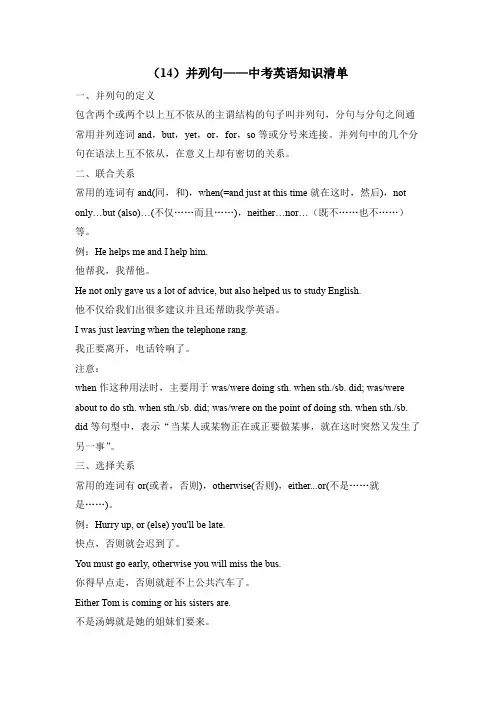
(14)并列句——中考英语知识清单一、并列句的定义包含两个或两个以上互不依从的主谓结构的句子叫并列句,分句与分句之间通常用并列连词and,but,yet,or,for,so等或分号来连接。
并列句中的几个分句在语法上互不依从,在意义上却有密切的关系。
二、联合关系常用的连词有and(同,和),when(=and just at this time就在这时,然后),not only…but (also)…(不仅……而且……),neither…nor…(既不……也不……)等。
例:He helps me and I help him.他帮我,我帮他。
He not only gave us a lot of advice, but also helped us to study English.他不仅给我们出很多建议并且还帮助我学英语。
I was just leaving when the telephone rang.我正要离开,电话铃响了。
注意:when作这种用法时,主要用于was/were doing sth. when sth./sb. did; was/were about to do sth. when sth./sb. did; was/were on the point of doing sth. when sth./sb. did等句型中,表示“当某人或某物正在或正要做某事,就在这时突然又发生了另一事”。
三、选择关系常用的连词有or(或者,否则),otherwise(否则),either...or(不是……就是……)。
例:Hurry up, or (else) you'll be late.快点,否则就会迟到了。
You must go early, otherwise you will miss the bus.你得早点走,否则就赶不上公共汽车了。
Either Tom is coming or his sisters are.不是汤姆就是她的姐妹们要来。
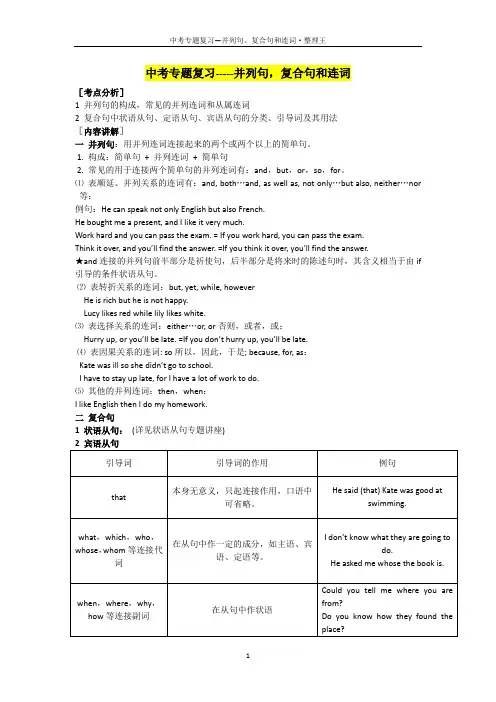
中考专题复习-----并列句,复合句和连词[考点分析]1 并列句的构成,常见的并列连词和从属连词2 复合句中状语从句、定语从句、宾语从句的分类、引导词及其用法[内容讲解]一并列句:用并列连词连接起来的两个或两个以上的简单句。
1. 构成:简单句+ 并列连词+ 简单句2. 常见的用于连接两个简单句的并列连词有:and,but,or,so,for。
⑴表顺延、并列关系的连词有:and, both…and, as well as, not only…but also, neither…nor 等:例句:He can speak not only English but also French.He bought me a present, and I like it very much.Work hard and you can pass the exam. = If you work hard, you can pass the exam.Think it over, and you’ll find the answer. =If you think it over, you’ll find the answer.★and连接的并列句前半部分是祈使句,后半部分是将来时的陈述句时,其含义相当于由if 引导的条件状语从句。
⑵表转折关系的连词:but, yet, while, howeverHe is rich but he is not happy.Lucy likes red while lily likes white.⑶表选择关系的连词:either…or, or否则,或者,或:Hurry up, or you’ll be late. =If you don’t hurry up, you’ll be late.⑷表因果关系的连词: so所以,因此,于是; because, for, as:Kate was ill so she didn’t go to school.I have to stay up late, for I have a lot of work to do.⑸其他的并列连词:then,when:I like English then I do my homework.二复合句1 状语从句:(详见状语从句专题讲座)①如果主句是现在的某种时态(包括一般现在时、现在进行时、现在完成时),则宾语从句的时态可根据实际情况而定:❝I remember he gave me a book yesterday.❝He has told me that he’ll leave for New York tomorrow.②如果主句是过去的某种时态(包括一般过去时、过去进行时),则宾语从句一定要用过去的某种时态(包括一般过去时、过去进行时、过去将来时、过去完成时):❝He told me that he would take part in the high jump.❝He asked me if I had taken his soap.★但宾语从句表示的是客观事实或真理,即使主句是过去时,从句也用一般现在时态:❝He told me that the earth is round.❝He said that Yao Ming is much taller than him.⑵宾语从句的语序用陈述句的语序What’s Kate’s e-mail address? Do you know? =Do you know what Kate’s e-mail address is?⑶宾语从句的连接词①当宾语从句是陈述句时,用that引导:“She was a good girl,” the teacher told us. =The teacher told us (that”) she was a good girl.★that用于下列情况时不可省略:1)当宾语从句的主语是that时:He says that that is a useful book.2)当从句前有插入语时:It says, on the card, that it is made in China.3)当宾语从句中含有主从复合句时:I’m afraid that if you’ve lost it, you must par for it.4)当两个或多个宾语从句由并列连词连接时,除第一个从句中的that可以省略外,其余从句中的that都不可以省略:He said (that) the film was very interesting and that he enjoyed seeing it very much.⑶否定转移当主句主语为第一人称,谓语动词是think,believe,suppose等时,要将从句的否定词转移到主句中,即主句的谓语动词用否定式:❝I don’t think he will come with you.⑷宾语从句的简化①宾语从句的主从句主语相同,且主句的谓语动词是hope,wish,decide,agree,choose 等时,从句可简化为不定式结构:I hope that I can receive your e-mail. =I hope to receive your e-mail.②宾语从句的主从句主语相同,且主句的谓语动词是know,remember,forget,learn等时,从句可简化为“疑问词+ 不定式”结构:She doesn’t know what she should do next.=She doesn’t know what to do next.③当主句谓语动词是ask,tell,show,teach等,且宾语从句的主语和句子的间接宾语一致时,从句可简化为“疑问词+ 不定式”结构:Will you please show me how I can work it out? =Will you please show me how to work it out?④动词seem后的宾语从句可用不定式(短语)来简化,但句型要适当变化。
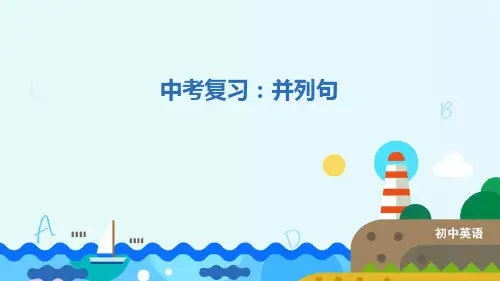
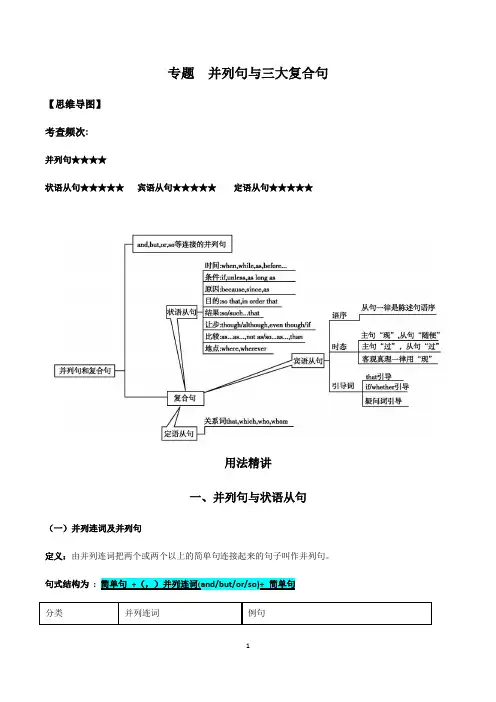
专题并列句与三大复合句【思维导图】考查频次:并列句★★★★状语从句★★★★★宾语从句★★★★★定语从句★★★★★用法精讲一、并列句与状语从句(一)并列连词及并列句定义:由并列连词把两个或两个以上的简单句连接起来的句子叫作并列句。
句式结构为:(二)状语从句定义:状语从句指句子用作状语时,起副词作用的句子。
类型:初中要求掌握的有以下六种:2).易错点:1. 一般情况下,时间和条件状语从句的谓语动词一般用“一般现在时”表示“一般将来时”,即是:“主将从现”。
常见连词:as soon as; when; until ;if ; unlessI will call you as soon as I arrive in Beijing. 我一到北京就给你打电话。
2. 让步状语从句中,although;though;even though ;even if 不能与but 连用;原因状语从句中,because不能与so 连用。
3. 结果状语从句中,so….. that 中so 后接形容词或副词;such…..that 中such 后接名词或名词短语;但当名词前出现“many,much,little,few”“多多少少”时,只能用so。
4. 时间状语从句中,while后的从句只能用延续性动词,when 后的从句可以用短暂性动词也可以用延续性动词。
5.从句:通常“连词+ 句子”单句短文填空1. Make up your mind, you will miss the valuable chance.Give me a chance,________ I'll give you a wonderful surprise.2. My mother wants to decorate our rooms in a modem look_______my father prefers a traditional style.3. It was time for her to have a new baby, _______it was also time for the young panda to independent.4. He is a shy man,_________he is not afraid of anything or anyone.5. Some animals carry seeds from one place to another, _________plants can spread to new places.课后巩固练习单项选择()1. it was late, she still turned on the TV and enjoyed the programs.A.BecauseB.ThoughC.SinceD.When()2. We left late, we didn’t catch the train.A.soB.becauseC.butD.though()3.The boy is clever, , he often makes mistakes because he’s careless.A.andB.howeverC.thoughD.but()4. it was raining heavily, he came on time.A.Though;butB.Though;/C.But;thoughD.But;/()5. I went into the classroom, the students were talking about the film.A.WhileB.AfterC.WhenD.If()6. I was very thirsty, I asked for some water to drink.A.thanB.forC.soD.as()7.I won’t believe that the five-year-old boy can read magazines I test him myself.A.ifB.whenC.afterD.until()8.They will begin their work they get there.A.ifB.untilC.as soon asD.before()9.I don’t know if he . When he ,give my best wishes to him.A.will come;will comeB.will come;comesB. es;comes es;will come()10. the students their teacher watches the football match on TV. They like football so much.A.Not only; but alsoB.Both; andC.Either; norD.Neither; or ()11. you your brother can join us. We want one of you.A.Both;andB.Neither;norC.Either;orD.Not only;but also()12.I speak slowly you can understand me.A.soB.so thatC.asD.since()13.Be careful, you’ll fall into the river.A.orB.butC.forD.of()14.He is a lovely boy we all like to play with him.A.so;thatB.too;toC.such;thatD.much;that()15.we won’t go to play football this afternoon the rain stops.A.afterB.ifC.unlessD.when()16.He keeps on trying there is little hope.A.butB.even thoughC.becauseD.so()17.The party didn’t start all the guests arrived.A.whenB.whileC.afterD.until()18.I hate pop music very much, but my father my mother likes it.A.both;andB.either;orC.neither;norD.not only;but also()19.You should make a good plan you do anything important.A.beforeB.afterC.thoughD.until二、宾语从句与定语从句(一)宾语从句定义:用一个完整的句子做宾语,叫做宾语从句。
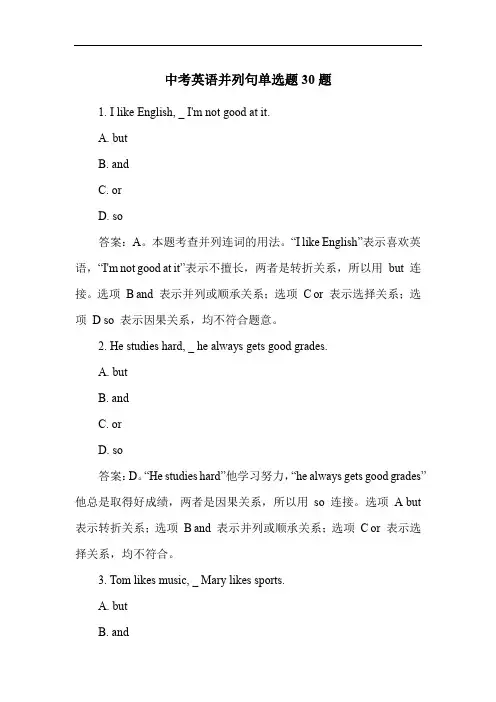
中考英语并列句单选题30题1. I like English, _ I'm not good at it.A. butB. andC. orD. so答案:A。
本题考查并列连词的用法。
“I like English”表示喜欢英语,“I'm not good at it”表示不擅长,两者是转折关系,所以用but 连接。
选项B and 表示并列或顺承关系;选项C or 表示选择关系;选项D so 表示因果关系,均不符合题意。
2. He studies hard, _ he always gets good grades.A. butB. andC. orD. so答案:D。
“He studies hard”他学习努力,“he always gets good grades”他总是取得好成绩,两者是因果关系,所以用so 连接。
选项A but 表示转折关系;选项B and 表示并列或顺承关系;选项C or 表示选择关系,均不符合。
3. Tom likes music, _ Mary likes sports.A. butB. andC. orD. so答案:A。
“Tom likes music”汤姆喜欢音乐,“Mary likes sports”玛丽喜欢运动,两者是不同的喜好,是转折关系,用but 连接。
选项B and 表示并列或顺承关系;选项C or 表示选择关系;选项D so 表示因果关系,都不符合此处语境。
4. You can play football, _ you can play basketball.A. butB. andC. orD. so答案:B。
“You can play football”你可以踢足球,“you can play basketball”你可以打篮球,两者是并列关系,用and 连接。
选项A but 表示转折关系;选项C or 表示选择关系;选项D so 表示因果关系,均不符合。
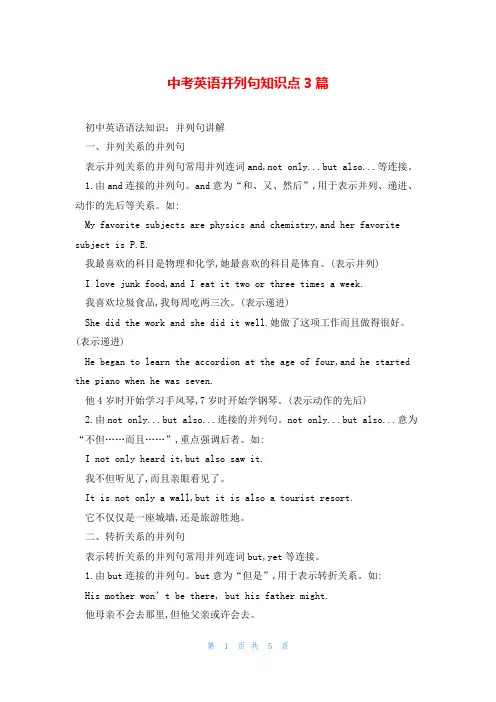
中考英语并列句知识点3篇初中英语语法知识:并列句讲解一、并列关系的并列句表示并列关系的并列句常用并列连词and,not only...but also...等连接。
1.由and连接的并列句。
and意为“和、又、然后”,用于表示并列、递进、动作的先后等关系。
如:My favorite subjects are physics and chemistry,and her favorite subject is P.E.我最喜欢的科目是物理和化学,她最喜欢的科目是体育。
(表示并列)I love junk food,and I eat it two or three times a week.我喜欢垃圾食品,我每周吃两三次。
(表示递进)She did the work and she did it well.她做了这项工作而且做得很好。
(表示递进)He began to learn the accordion at the age of four,and he started the piano when he was seven.他4岁时开始学习手风琴,7岁时开始学钢琴。
(表示动作的先后)2.由not only...but also...连接的并列句。
not only...but also...意为“不但……而且……”,重点强调后者。
如:I not only heard it,but also saw it.我不但听见了,而且亲眼看见了。
It is not only a wall,but it is also a tourist resort.它不仅仅是一座城墙,还是旅游胜地。
二、转折关系的并列句表示转折关系的并列句常用并列连词but,yet等连接。
1.由but连接的并列句。
but意为“但是”,用于表示转折关系。
如:His mother won’t be there, but his father might.他母亲不会去那里,但他父亲或许会去。
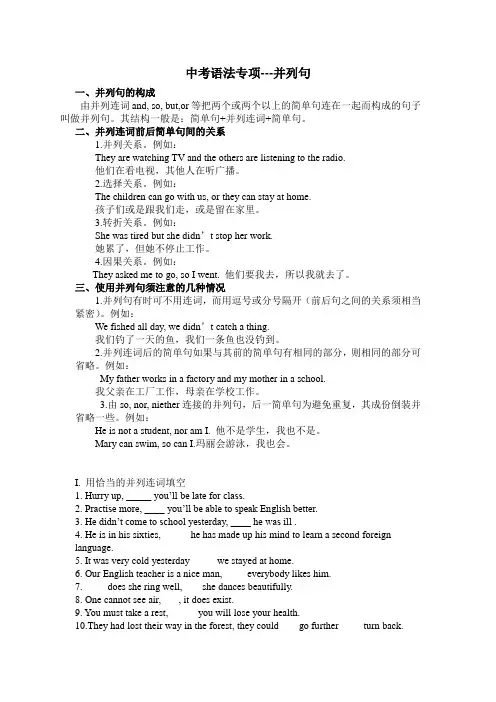
中考语法专项---并列句一、并列句的构成由并列连词and, so, but,or等把两个或两个以上的简单句连在一起而构成的句子叫做并列句。
其结构一般是:简单句+并列连词+简单句。
二、并列连词前后简单句间的关系1.并列关系。
例如:They are watching TV and the others are listening to the radio.他们在看电视,其他人在听广播。
2.选择关系。
例如:The children can go with us, or they can stay at home.孩子们或是跟我们走,或是留在家里。
3.转折关系。
例如:She was tired but she didn’t stop her work.她累了,但她不停止工作。
4.因果关系。
例如:They asked me to go, so I went. 他们要我去,所以我就去了。
三、使用并列句须注意的几种情况1.并列句有时可不用连词,而用逗号或分号隔开(前后句之间的关系须相当紧密)。
例如:We fished all day, we didn’t catch a thing.我们钓了一天的鱼,我们一条鱼也没钓到。
2.并列连词后的简单句如果与其前的简单句有相同的部分,则相同的部分可省略。
例如:My father works in a factory and my mother in a school.我父亲在工厂工作,母亲在学校工作。
3.由so, nor, niether连接的并列句,后一简单句为避免重复,其成份倒装并省略一些。
例如:He is not a student, nor am I. 他不是学生,我也不是。
Mary can swim, so can I.玛丽会游泳,我也会。
I. 用恰当的并列连词填空1. Hurry up, _____ you’ll be late for class.2. Practise more, ____ you’ll be able to speak English better.3. He didn’t come to school yesterday, ____ he was ill .4. He is in his sixties, _____ he has made up his mind to learn a second foreignlanguage.5. It was very cold yesterday_____ we stayed at home.6. Our English teacher is a nice man, ____ everybody likes him.7. ____ does she ring well, ___ she dances beautifully.8. One cannot see air, ___, it does exist.9. You must take a rest, _____ you will lose your health.10.They had lost their way in the forest, they could ___ go further ____ turn back.11.You don’t like it, ____ does your sister.12.I have read one of his novels ___ a few of his plays.II. 单项选择1.The singer is not well thought of _______ his records do not sell well.A. butB. andC. orD. while2. I want to pick up the programme, _____ I haven’t got a short-wave radio.A. forB. soC. andD. but3. Don’t tell a lie any more, _____ I won’t make friends with you.A. norB. neitherC. butD. or4. Every person wants to keep fit, ______ we need healthy foods.A. soB. andC. whileD. but5. The fire was very big, _____ the firefighters put it out in half an hour.A. butB. whileC. howeverD. yet6. They are going to return some of the milu deer to the wild, _____ their number increases year by year.A. soB. forC. therefore D and7. There are some jobs that men can do well _____ there are also some jobs that men cannot do well.A. whileB. becauseC. orD. so8. He is over forty, _______ he insists on learning another foreign language.A. andB. soC. orD. still9. Be careful when you stand on the dam. _____, you will fall into the water.A. OtherwiseB. ThereforeC. OrD. And10.They did not invite Dr Smith to the medical conference, ______ did we.A. eitherB. soC. neitherD. and11.Would you like a cup of coffee_____ shall we get down to business right away?A. andB. thenC. orD. otherwise12.Tony likes listening to music, _______he hates practising the violin.A. butB.soC.andD. or13.Hold on to your dreams, _______ one day they may just come true.A. andB.butC.soD. or14.We are going to the bookstore. You can come with us _______you can meet us there later.A. andB.butC.orD.then15.Bicky caught a bad cold yesterday, _______ he had to stay at home.A. becauseB.butC.orD.so16.—I usually have milk and bread for breakfast.—__________.A. So have IB.So I haveC.So do ID.So I do。
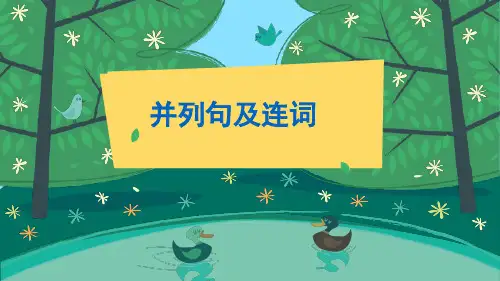
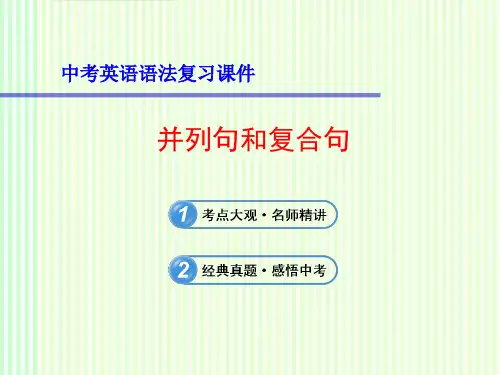
中考英语语法并列连词复习讲义及总结与整理连词是虚词,起着连接词与词、短语与短语、句子与句子的作用,所以连词不能独立担任句子的成分。
连词包括并列连词和从属连词。
并列连词用来连接并列关系的词、词组或分句,如and,or,but,so,for,both...and,either...or,neither...nor,not only...but also等都是并列连词。
从属连词用来引导从句,如that,when,till,until,after,before,since,because,if,whether,though,although,so...that,so that,in order that,as soon as,as...as等都是从属连词。
本章将分别讲述一些主要连词的用法。
典型例句:1.Li Lei and Jim are good friends.(李雷和吉姆是好朋友。
)(and是并列连词)典型例句:2.I think that he his sleepy.(我想他困了。
)(that 是从属连词)并列连词1.and:和,而且I like basketball,football and table tennis.(我喜欢篮球、足球和乒乓球。
)Brother and I went to the bookstore yesterday.(我和哥哥昨天去了书店。
)(1)and的基本用法and意为“和”“而且”,用来连接对等关系的词与词、短语与短语、句子与句子。
He stood up and put on his hat.(他站起来,戴上帽子。
)(and连接两个动词短语)I went to the Summer Palace and he went to the Forbidden City.(我去了颐和园,他去了紫禁城。
)(and连接两个句子)补充:如果是连接三个或三个以上的单词或词组,and一般放在最后一个单词或词组前。
中考英语复习---并列句、专项练习55题及答案中考英语专项复习--并列句解析、练习55题及答案并列句语法解析由并列连词把两个或两个以上的简单句连在一起的句子叫并列句。
不同的并列连词表示并列分句之间的不同关系。
根据并列分句之间的关系不同,并列句可以分为以下几种:一、表示联合关系的并列句这类并列句常用并列连词and (和), not only ... but also... (不但……而且……)等来连接,这时分句之间是顺承关系或并列关系。
and 一般不译出来。
例如:1. We bought her a birthday present, _____ she liked it very much.A. soB. orC. andD. but[分析]根据语境,句意为“我们为她买了一件生日礼物,她非常喜欢。
”表示联合关系,故选C。
2. —Didn’t you give roses to your father on Father’s Day?— Oh, not only my father, _____ my grandpa got red roses.A. orB. andC. butD. until[分析]结合语境,表示联合关系,not only ... but also ...不但……而且……中的also可省略,故选C。
二、表示转折关系的并列句这类并列句常用but (但是;可是),yet(可是;然而),while (而)等来连接,后面分句与前面分句之间有意义上的转折关系。
例如:1. — Would you like to go to the concert with me?—I’d love to, _____ I can’t. I have a lot of homework to do.A. orB. butC. soD. and[分析]语境分析,表示转折关系,故应选B。
2. The doctors tried their best to save the patient’s life, _____ failedA. orB. soC. butD. because[分析] 该句意为“医生们尽力挽救那个病人的生命,但是失败了。
一、选择题1.His dictionary his radio are on the desk.A.and B.but C.or D.of2.I think English is difficult __________ interesting. I like it.A.but B.or C.so D.and3.I tried calling you, your phone was out of service.A.and B.but C.so D.or4.My grandpa is old he thinks he is young.A.and B.or C.so D.but5.I know her, ____________I forget(忘了)her name.A.so B.and C.but6.—Alice didn't go to the party ______her illness.—I'm sorry to hear that.A.because B.but C.so D.because of 7.The football match tonight is exciting, ______don't forget to do your homework, children. A.however B.but C.so D.or8.______ Lucy ______Wendy speaks good English, so they cannot communicate with these British students very well.A.Neither, nor B.Not only, but also C.Both, and D.Either, or9.He ________ like baseball. ________ he likes football.A.don’t, but B.doesn’t, and C.doesn’t, but D./, and 10.Mike does his homework and __________ to play football after school every day. A.goes B.go C.to go D.went11.I wear more clothes today, ______ I still catch a cold.A.because B.but C.so D.although 12.The UK is a small__________beautiful country.A.and B.but C.so13.The man hurried to the railway station, _______ it was too late. The train had just left. A.or B.but C.so D.for14.Dogs are good pets, ________ I do not like it when they leave hair all over.A.or B.but C.and D.so15._____________Jack _____________Jason have visited Shanghai Grand Theatre. A.Neither…nor B.Both…and C.Either…or D.Not only…but also 16.—Let’s talk ab out the result of the survey.—________ many students like to watch sports shows, ________ game shows are the most popular.A.Although; but B.Although; / C.But; although D.But; /17.A break between classes is a good time for students to play sports and talk with theirclassmates, so it __________helps with students' health,___________ improves their social skills. A.either; or B.neither; nor C.not only; but also D.not; but 18.—What do you think of the film The devil child of Nezha came into the world ?—I like it, ________ I don’t like its music.A.and B.but C.so D.too19.I enjoy adventure films, but ______ my father ______ my mother likes it. A.neither...nor B.not only...but alsoC.either...or D.both...and20.______ Lily ______ I will go to watch the film because one of us must be at home and look after the grandma.A.Either, or B.Both, andC.Neither, nor D.Not only, but also21.—Can Dave paint?—Yes, he can, ________ he can’t paint very well.A.and B.or C.but D.though22.He speaks English French. He speaks Chinese.A.either; or B.not only; but alsoC.both; and D.neither; nor【参考答案】***试卷处理标记,请不要删除一、选择题1.A解析:A【解析】【详解】句意:他的字典和他的收音机在桌子上。
并列连词一.概念并列连词连接两个或两个以上平行的字、词组或分句,主要是用来表示并列关系、选择关系、因果推理关系等。
二.相关知识点讲解1.表示并列关系的连词有:and, both…and…, not only…but also…和neither…nor…等1) and:和,并且A :基本用法:“and”表示“和”、“并且”的意思,用来连接对等关系的字和字,片语和片语,句子和句子。
My brother and I study in the same school.Our knowledge may come from the books and from practice.We are singing and they are dancing.B: 特别用法:祁使句后连接and,有条件句作用,此时and=if you…,you'll…Go straight on, and you'll see the library.==______________ go straight on, you ______________ the library.2)both…and…既…也…,(两者)都…A、both…and…可用来连接两个并列的主语、谓语、宾语、表语和状语等。
当连接两个并列的主语时谓语动词通常用复数形式。
Both Jim and Kate _________(be) from England.B、both…and…否定句表示部分否定。
Both my father and my mother aren't doctors. 译为:__________________________3)neither…nor…:既不…也不…neither…nor…连接两个并列主语时,谓语动词采取就近原则。
Neither I nor he _________(have) seen the play before.4)not only…but also…:不但…而且…not only…but also…两个并列连词和both…and…的共同特征是都连接两个相同的句法单位如主语、谓语、宾语、表语和状语等。
(每日一练)全国通用版初三英语并列复合句必考知识点归纳单选题1、-I don't like fish ________ chicken. What about you? -I don't like fish, ________ I like chicken very much. A.and; andB.or; orC.but; orD.or; but答案:D解析:句意:-我不喜欢鱼肉或者鸡肉。
你呢?-我不喜欢鱼肉,但是我非常喜欢鸡肉。
and和,而且,表示并列,常用于肯定句中;or或者,常用于否定句中;but但是,表示转折。
根据句意可知,第一个空表示并列,是否定句,应用or连接;第二个空表示转折的关系,用but。
故选D。
2、The dress was very expe nsive, ________ I didn’t buy it.A.butB.becauseC.soD.and答案:C解析:句意:这件衣服太贵了,所以我没有买。
so是“所以”的意思,故选C。
小提示:and, but, so, because的区别and 是并列关系。
例如:I like apple and banana. 我喜欢苹果和香蕉。
but代表转折关系。
例如:I like many kinds of fruits, but I do not like apple. 我喜欢很多种水果,但是我不喜欢苹果。
so代表顺承关系。
例如:The weather looks bad, so we had better take umbrellas. 天气看起来不好,所以我们最好带上雨伞。
because代表原因。
例如:I am very tired, because I have not slept for two days. 我很累,因为我已经两天没睡觉了。
3、Don’t give up,_______ you will never succeed.A.andB.butC.soD.or答案:D解析:句意:不要放弃,否则你永远不会成功。